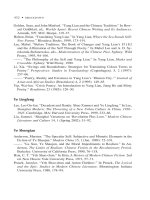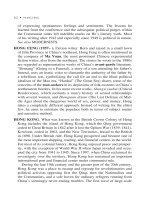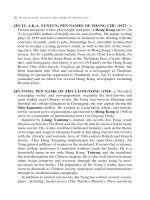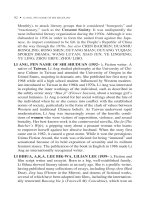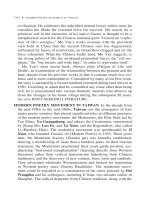"Historical Dictionary of Modern Chinese Literature" by Li-hua Ying - Part 12 pdf
Bạn đang xem bản rút gọn của tài liệu. Xem và tải ngay bản đầy đủ của tài liệu tại đây (95.3 KB, 10 trang )
JIN YI, A.K.A. YUNYUN, PEN NAMES OF ZHANG CHU (1927– ).
Fiction and prose writer, playwright, and poet. A Hong Kong native, Jin
Yi is a prolific author of mainly novels and novellas. He began writing
plays in 1949 and later concentrated on fictional work, dealing with the
concerns of youth, such as jobs, friendship, love, and other worries that
tend to occupy a young person’s mind, as well as the life of the work-
ing class. His later works treat larger issues of Hong Kong’s history and
society. Jin Yi’s publications include Tong xin jie (True-Love Knot), Nu
hai tong zhou (On the Same Boat in the Turbulent Sea), Cuoshi (Blun-
der), and Xianggang shui shang yi jia ren (A Family on the Hong Kong
River). One of his novels, Yingfeng qü (Singing against the Wind), has
been translated into Thai and serialized in a newspaper in Thailand,
helping to spread his reputation to Southeast Asia. Jin Yi worked as a
journalist and an editor for several Hong Kong newspapers including
Wenhui Daily.
JIN YONG, PEN NAME OF ZHA LIANGYONG (1924– ). Novelist,
screenplay writer, and newspaperman. Arguably the best-known and
most widely read Chinese writer, Jin Yong was born in Zhejiang and
finished his college education in Chongqing, the war capital during the
Sino-Japanese conflict. He worked as a journalist, editor, and transla-
tor for various news organizations and moved to Hong Kong in 1948 to
serve as a translator of international news for Dagong Daily.
Inspired by Liang Yusheng’s martial arts novels, Jin Yong wrote
Shujian enchou lu (The Book and the Sword) and its success led to many
more novels. His works combine traditional features, such as the theme
of revenge and magical elements found in late Qing martial arts novels,
with the chivalry and romantic love of 18th-century British and French
novels. After Deng Xiaoping implemented his open-door policy, Jin
Yong gained millions of readers in the mainland. It seems that everyone,
from college professors to transient workers, reads his books. He is a
household name in not only Hong Kong, Taiwan, and the mainland,
but also throughout the Chinese diapora. He is also well known in many
other Asian countries and overseas through the many kung fu mov-
ies based on his books. The popularity of Jin Yong’s works does not
seem to diminish as Chinese society undergoes radical transformations
through its modernization campaigns.
In addition to martial arts novels, Jin Yong has written several screen-
plays, including Juedai jiaren (The Peerless Beauty), Wuye qinsheng
82 • JIN YI, A.K.A. YUNYUN, PEN NAMES OF ZHANG CHU
(Sound of Music at Midnight), and San lian (Three Loves). He is also
a newspaperman and founder of Mingbao Daily and the Mingbao pub-
lishing house.
JING FU, PEN NAME OF GUO JINGFU (1942– ). Novelist and essayist.
Like his more famous colleague Jia Pingwa, Jing Fu was born in Shang-
zhou, Shaanxi Province, and like Jia, he has also written extensively about
the rural societies of the northwestern province, having published many
short stories, essays, and novels. His best-known work is Bali qing chou
(Feud in Bali), a novel that portrays the entangled relationships of two
families in a small town in southern Shaanxi from the 1950s to the 1980s.
While centering on two women’s unfortunate experiences and unhappy
marriages, the novel reflects the starvation of the 1950s, the destruction
of the Cultural Revolution, and the reform era, offering a glimpse into
the vulnerability and lack of recourse in the lives of ordinary people and
the destruction of family as a result of terrible abuses of power and human
cruelty. Jing Fu’s recent work is an environmental novel, Lu ming (The
Cries of Deer), which portrays a young man’s arduous journey to fulfill his
father’s dying wish to release a herd of badly abused deer back to the for-
est. Characteristic of Jing Fu’s style, the novel mixes the sensational with
the serious, resulting in a popular, entertaining novel with a nod to social
criticism. Jing Fu sees environmental problems as the biggest challenge of
the 21st century for humankind and plans to write more on the issue.
JULY SCHOOL (QIYUE PAI). A literary school formed in the first
half of the 20th century around the journal Qi yue (July), which was
founded and edited by Hu Feng, a Marxist theoretician who advocated
“guofang wenxue” (literature for national defense) and later urged writ-
ers to focus on spontaneous, natural responses found in human behavior
and historical events. This subjective stance was
severely criticized by
members of the left-wing literary circles, who believed that literature
should faithfully serve the Communist Party’s political agendas. In the
campaign against intellectuals in the early 1950s, Hu and his followers
were condemned as counterrevolutionaries.
– K –
KE YUNLU, PEN NAME FOR BAO GUOLU (1946– ). Novelist. One
of the most prolific and popular novelists in China today, Ke Yunlu
KU YUNLU, PEN NAME FO BAO GUOLU • 83
has written more than a dozen novels since 1980. Xin xing (A Rising
Star), published in 1984, and the television show based on it earned Ke
his national fame. The novel portrays a county party secretary and the
difficulties he encounters in the Chinese bureaucracy notorious for its
corruption, inefficiency, and nepotism. With this and other novels about
the inner workings of Chinese political and social system, Ke soon came
to be known as an astute interpreter of Chinese officialdom; his novels,
particularly Ye yu zhou (Night and Day) and Shuai yu rong (Fall and
Rise), both depicting the complexities of life in Beijing in the 1980s,
have been deemed “must reads” for those who wish to understand Chi-
nese politics and social relationships.
In addition to his works on contemporary politics, Ke has published
several novels about the tumultuous years of the Cultural Revolution.
Heishanbao gang jian (History of Heishanbao) paints a village in the
throes of absolute tyranny where the leader catalogs his conquests in
politics and sex in secret codes. Furong guo (The Hibiscus Country)
offers a panoramic view of Chinese society, from the capital city to a
small village, from high-ranking officials to the common people, in par-
ticular the young Red Guards later sent to China’s remote countryside.
Also set in the Cultural Revolution but focusing on the experience of
young people growing up in an era of political radicalism and social de-
struction, Ke has written Xisheng (Sacrifice), whose young protagonists
struggle to fulfill political idealism and romantic love at a time of moral
confusion, Mengmei (Obscuration), a tragic tale set in a small southern
town that depicts the sexual awakening of a boy through his relation-
ship with an older woman and how they are destroyed by an unforgiving
society, and Nage xiatian ni gan le shenme (What Did You Do That
Summer), an investigation of the tragic fate of a schoolteacher who was
beaten to death in the name of justice by his rebellious students who
live to regret their atrocious act. Picking up the coming-of-age theme,
Fuqin xianyi ren (Suspect Fathers), published in 2005, examines the
maturing process of a boy as he interacts with the opposite sex and with
the older generation, and Chenggong zhe (A Success Story) is about the
experience of a young man of humble beginnings who achieves material
success at the expense of moral and spiritual integrity.
Ke is a man of many interests. He has forayed into such areas as psy-
chology and mysticism. His curiosity about the workings of the human
mind has resulted in a psychological novel, Jidu zhi yanjiu (A Study
84 • KE YUNLU, PEN NAME FOR BAO GUOLU
of Jealousy), featuring a gathering of writers, a social group the author
considers to be the most susceptible to jealousy. His foray into the study
of qigong, a system of deep-breathing exercises thought to possess mi-
raculous powers, led to the publication of a novel, Da qigong shi (The
Qigong Master), which, along with his other metaphysical writings,
caused a great deal of controversy.
KONG JIESHENG (1952– ). Fiction and prose writer. Born and raised
in Guangzhou, Kong Jiesheng was sent to work for four years in rural
Guangdong, an experience that became the source of his writing. In the
late 1970s, Kong won several awards for his stories before he published
his best-known work, “Nanfang de an” (The Shores of the South), in
1982. The story portrays several educated youths learning life’s impor-
tant lessons from their experiences during and after the turbulent years
of the Cultural Revolution. Two years later, another novella, “Da lin-
mang” (The Great Forest), about the tragic fate of five educated youths
on the state farms of Hainan Island, also garnered national notice.
KUN NAN, A.K.A. YEDONG, PEN NAMES OF CEN KUNNAN
(1935– ). Poet and fiction and prose writer. A Hong Kong native, Kun
Nan wrote for newspapers in his youth and cofounded several liter-
ary journals including Shi duo (Blossoms of Poetry) and Xin sichao
(New Trends). In 1955 he published his first story, “Wen: chuang shiji
de guanmian” (Kiss: The Royal Crown of Genesis). He has written
two novels, Di de men (The Earth’s Gate) and Tiantang wu zai zu xia
(Heaven Dances under the Feet), and a short story collection Xi jing
de fengliu (The Romantic Life of Playing with Whales). Throughout
his career, Kun Nan has been interested in examining the effects of
modernity on the psychological state of Hong Kong residents. In his at-
tempts to find the moral and spiritual anchor that would protect people
from the forces that alienate them from society and from themselves,
Kun Nan represents the voice of the intellectual struggling to come to
grips with his cultural identity under the dual pressure of colonialism
and commercialism. His heroes begin as idealistic hopefuls, go through
trials and tests, and finally as their dreams are dashed become utterly
disillusioned. This pervasive hopelessness reflects what the author
considers the prevailing views held by Hong Kong intellectuals in the
1950s and 1960s.
KUN NAN, A.K.A. YEDONG, PEN NAMES OF CEN KUNNAN • 85
– L –
LAI HE, A.K.A. LAI HO (1894–1943). Fiction writer and poet. Born
and raised in Japanese- colonized Taiwan, Lai graduated from medi-
cal school and practiced medicine throughout his life. From 1917 to
1919, he worked in a hospital in Xiamen, Fujian Province, where his
Chinese was much improved as he became increasingly drawn to na-
tionalist causes. After his return to Taiwan, Lai became involved in anti-
Japanese activities, attracting the attention of the Japanese authorities,
who arrested him in 1924. In 1941, he was again arrested and with his
health destroyed during the two-year prison term, Lai died shortly after
he was released from prison.
Under the influence of the May Fourth Movement, Lai was made
aware of the important role literature could play in awakening the na-
tionalist consciousness of the people; throughout his career he insisted
on addressing contemporary political and social issues. As one of the
first generation of Taiwanese writers, Lai began by writing stories in
Japanese, as well as classical-style poetry in Chinese, a skill he had
honed at a young age from a private tutor. After joining forces with
other new literary movement proponents, including Zhang Wojun,
Huang Chaoqun, and Yang Kui, Lai adopted the vernacular as a me-
dium for his poetry and fiction to describe the collapse of the old social
order and the sufferings of the poor, and above all, to expose the injus-
tice the people of Taiwan suffered under the Japanese, reflecting his
nationalist sentiments.
Lai’s first story, “Dou nao re” (Festivity), shares the same concern
of his mainland contemporaries who were passionate about eradicating
the problems within traditional Chinese culture. The story satirizes the
grandiose competitions held at religious festivals in rural Taiwan, de-
picting them as superstitious and pointless, a view similar to Lu Xun’s
criticism of the deficiency of the Chinese cultural trait.
Other stories,
however, focus on the economic exploitation and cultural assimilation
policies imposed by the Japanese. Told in the realist mode, these stories
are characterized by their biting satire and poignant symbolism. “Yi
gan chen zai” (The Man with a Steelyard), considered his representative
work, tells the story of a vegetable seller who struggles to make a living
but ends up in jail on charges brought against him by a Japanese police-
man who accuses him of cheating with a dishonest steelyard. His wife
has to borrow money to bail him out, which further reduces the family’s
86 • LAI HE, A.K.A. LAI HO
financial circumstances. Unable to climb out of his dire situation, the
vegetable seller kills the policeman and then himself. The irony that a
steelyard, a symbol of fairness, leads to injustice is an indication of Lai’s
narrative art. “Re shi” (Making Trouble), centers on the Japanese police
chief’s chickens, which are in the habit of running into the neighbor’s
yard to eat the vegetables. For fear of causing any trouble, the neighbor
stomps the ground in an attempt to scare the chickens away. Neverthe-
less, the Taiwanese family is still charged with chicken theft. Lai points
out that in the Japanese-occupied Taiwan, there is no justice for the
Taiwanese people and the only way out for them is to break free of their
oppressors.
Unlike the subtle and satirical tone found in his fictional work, the
voice in Lai’s poetry is direct and indignant, lamenting the ill fate of the
Taiwanese people and denouncing the Japanese. “Juewu de xisheng”
(The Awakened Sacrifice) is a political poem written to show support
for the sugarcane farmers suppressed by the Japanese. “Nanguo aige”
(The Song of Sorrow from the South) is also a battle cry against the
colonizers. While writing stories and essays, Lai also took up editing for
newspapers and literary journals through which he helped nurture young
Taiwanese writers, earning him the honor of being called the “wet-nurse
and father of modern Taiwanese literature.”
LAI SHENGCHUAN, A.K.A. STAN LAI (1954– ). Born in Washing-
ton, D.C., Lai Shengchuan moved to Taiwan in 1966 with his family
when his diplomat father received a new assignment in the foreign
ministry of the Republic of China. He moved back to the United
States in 1978 to study dramatic art at the University of California at
Berkeley. After he received his Ph.D. in 1983, Lai accepted a teaching
post at the newly established National Art Institute in Taipei. It did
not take long for Lai to make a name for himself. The pivotal moment
came in 1985 when his Performance Workshop Theater staged his Na
yi ye women shuo xiangsheng (That Night We Performed Crosstalk),
which was an overnight hit. A few years later, he created more “cross-
talk” plays: Zhe yi ye shui you lai shuo xiangsheng (Tonight Who
Will Perform Crosstalk, 1989); You yi ye tamen shuo xiangsheng
(One More Night They Performed Crosstalk, 1997); and Qian xi ye
women shuo xiangsheng (On the Eve of the Millennium We Perform
Crosstalk, 2000). By using a traditional art form, crosstalk, Lai cre-
ated modern plays that look at the collective memory of the Chinese
LAI SHENGCHUAN, A.K.A. STAN LAI • 87
people and their views of history, tradition, and life in general. In Na
yi ye women shuo xiangsheng, two crosstalk performers masquerade
as the great crosstalk masters who have been invited to give a per-
formance but fail to show up, alluding to the disappearance of tradi-
tion in modern Taiwan society. Qian xi ye women shuo xiangsheng
covers two historical periods. The first episode takes place at the end
of the 19th century with two crosstalk artists engaging in a conversa-
tion with a Manchu noble; in the second episode, the same theater is
moved to Taipei and on the eve of the millennium the performance of
a pair of crosstalkers is interrupted by a politician campaigning for a
seat in the Taiwan parliament. The crosstalk series breathed life into
an old form that had virtually disappeared in Taiwan.
In total, Lai has created almost 30 plays, including his most famous
An lian taohua yuan (Pining . . . In Peach Blossom Land; 1986), a
comedy that involves two theater groups mistakenly booked into the
same theater for dress rehearsal, one performing An lian (Secret Love),
a serious drama set in present-day Taiwan about a dying elderly man
longing to see his first love from whom he was separated in 1949, and
the other Taohua yuan (Peach Blossom Land), a farce that parodies a
lyrical prose work written by a fourth-century Chinese poet about a man
stumbling into a utopian world of peace and tranquility. The schedul-
ing conflict reflects the more serious philosophical differences between
the two groups forced by circumstances to share the same stage. As a
result, chaos and madness ensue, creating some hilarious theatrical mo-
ments that underscore the contending views in the Chinese world with
regard to visions of longing, memory, diaspora, identity, and life.
In
his eight-hour epic drama Ru meng zhi meng (A Dream Like a Dream;
2000), Lai sets up a narrative structure in which past and present, dream
and reality intersect to create a fantastic world in which the characters
engage in thoughtful reflections on national and cultural identity, which
is shaped by history and shifting changes in politics, the experience of
home, exile, and immigration. This poetic play about self-transcendence
is clearly influenced by Tibetan Buddhism, which Lai has been study-
ing for years. Lai’s other plays include Yuanhuan wuyu (Circle Story;
1987), Xi you ji (Journey to the West; 1987), Huitou shi bi an (The Is-
land and the Other Shore; 1989), Taiwan guai tan (Strange Tales from
Taiwan; 1991), Hongse de tian kong (Red Sky; 1994), Xiansheng kai
ge men (Please Open the Door, Sir; 1998), and Wo he ta he ta he ta (Me
and Him and Him and Him; 1998).
88 • LAI SHENGCHUAN, A.K.A. STAN LAI
Arguably, the most influential playwright/director alive today in the
Chinese-speaking world, Lai has not only revived Taiwan’s theater but
also brought enthusiasm and excitement to theaters in China and in the
Chinese diaspora. Lai’s dramatic aesthetics—the multilayered structure,
highly theatrical language, symbolic stage design, humor, romantic
mood, free-flowing mise-en-scène, cultural implications, deep sense
of tragedy, and persistent attempt at wrestling with some profound and
abstract ideas—have far-reaching impacts in the Chinese theater. His
plays, which are often compared to works by Tony Kushner, Robert
Lepage, and Peter Brook, have toured internationally and have been
well received. For his achievement as an artist and his leadership in
the Taiwanese theater, Lai has twice (1988, 2001) received Taiwan’s
highest award for the arts, the National Arts Award. See also SPOKEN
DRAMA.
LAO SHE, PEN NAME OF SHU QINGCHUN (1899–1966). Novelist.
A Beijing native of Manchu nationality, Lao She lost his father, who
fought the Boxers as a garrison soldier in the imperial army. As a child,
Lao mingled with rickshaw pullers, peddlers, street singers, and other
such lower-class people and learned the language and culture of the
street, which would become the center of his writing. Upon graduation
from the Beijing Normal School in 1918, Lao She was made principal
of a primary school. In the following year, the May Fourth Movement
broke out. Not an active participant, Lao She was nevertheless inspired
by the ideas promoted by its proponents: democracy, science, and per-
sonal emancipation.
In the summer of 1924, Lao She took up a position as a lecturer in the
School of Oriental and African Studies at the University of London. This
trip would prove to be pivotal in his writing career. Inspired by the En-
glish novels he had read, particularly those written by Charles Dickens,
Lao She tried his hand at writing novels. Adept at telling the stories of
the middle and lower classes in Beijing, Lao She depicted in his early
works the little people and their struggle for life in the midst of poverty
and oppression. The protagonist of Lao Zhang de zhexue (Mr. Zhang’s
Philosophy) is a scoundrel whose actions are motivated by greed. While
deriding Mr. Zhang’s lack of morality, Lao She treats him as a comic
character, giving him a touch of humanity, and thus accentuating the
ordinariness of human depravity. The ignorant and incompetent youth
in Zhaozi yue (Thus Spake Master Zhao) is another one of Lao She’s
LAO SHE, PEN NAME OF SHU QINGCHUN • 89
flawed characters who idles away his life at mahjong tables and opera
houses, seemingly unaffected by the changes brought to China by the
May Fourth Movement. Er Ma (Mr. Ma and Son: A Sojourn in Lon-
don), a novel that reflects the author’s own encounters with the Chinese
expatriates in London, chronicles the misfortunes of a man and his son
who go to London to run a gift shop. The son is patriotic, proud of be-
ing Chinese, but the father worships the West and emulates everything
Western. A skilled storyteller and a master of Beijing folklore and dia-
lect, Lao She proves in these novels that he is also a master satirist.
After he returned to China, Lao She published several books in-
cluding Mao cheng ji (Cat Country: A Satirical Novel of China in the
1930s), a satirical novel focusing on the cat people’s destruction of
their educational and political systems out of sheer indifference and
their complete abandonment of culture in favor of perpetual revolution.
The novel conveys his deep concern for the Chinese society plagued by
xenophobia, on the one hand, and the rush to embrace Western culture,
on the other. Lihun (Divorce) exposes the injustice of the bureaucratic
system through the portrayal of two office clerks, the old-fashioned Big
Brother Zhang and the crafty Little Zhao. Lao She is a master storyteller
with a great sense of humor and keen moral insights, and nowhere is
this talent of his applied more aptly than in the novel Luotuo Xiangzi
(Camel Xiangzi), a tragic story of a rickshaw puller. Xiangzi migrates
from the countryside to Beijing hoping to make a better life for himself
through hard work. His fortune fluctuates, until he is reduced to total
disillusionment. Xiangzi’s descent from an ambitious and honest young
entrepreneur to a virtual beggar deprived of pride and self-respect repre-
sents the physical and moral destruction of the individual at the hands of
society’s evils. The vivid characters and the lively language they speak
make the novel a uniquely realistic portrayal of city life.
Among Lao She’s works written during the Sino-Japanese War, Si
shi tongtang (Four Generations under One Roof) stands out. Inspired by
the experience of his family while living in Japanese-occupied Beijing,
this monumental novel depicts the hardships, humiliation, and uncon-
querable spirit of Chinese citizens in their resistance against Japanese
aggression. The author’s juxtaposition of the disintegration of a tradi-
tional family of four generations under one roof with a beaten nation
under foreign occupation highlights the plight of the Chinese people.
After the war, Lao She and the playwright Cao Yu went to America
on a lecture tour as guests of the U.S. State Department. When his year-
90 • LAO SHE, PEN NAME OF SHU QINGCHUN
long contract expired, Lao She remained in the United States, where he
finished Si shi tongtang, wrote Gushu yiren (The Drum Singers), and
assisted Ida Pruitt and Helena Kuo in translating them into English. In
December 1949, Lao She returned to Beijing. A much-celebrated writer
in Communist China, Lao She assumed a string of largely honorary ap-
pointments, including vice president of the Association of Chinese Writ-
ers and Artists and vice president of the Chinese Writers’ Association.
Despite his busy official schedules, Lao She continued to write, mainly
plays, among which Longxu gou (Beard Ditch) and particularly Cha
guan (Teahouse: A Play in Three Acts) have received critical acclaim.
Lao She’s final work was an unfinished novel entitled Zhenghong qi
xia (Beneath the Red Banner), which was published in 1980, 14 years
after the author’s death. It chronicles the decline of the bannermen, the
original military troops of the Manchu rulers. At the onset of the tumul-
tuous Cultural Revolution, Lao She became one of the first targets of
the Red Guards. He committed suicide by drowning himself in a lake
on the outskirts of Beijing, tragically ending a life of literary eminence.
See also SPOKEN DRAMA.
LEFT-WING ASSOCIATION OF CHINESE WRITERS (ZHONG-
GUO ZUOYI ZUOJIA LIANMENG). Established in 1930 in Shang-
hai, the progressive association absorbed members from other organiza-
tions, such as the Creation Society. Founding members included Lu
Xun, Mao Dun, Xia Yan, Yu Dafu, Feng Naichao, Feng Xuefeng,
Tian Han, Jiang Guangci, Yang Hansheng, Hong Lingfei, and oth-
ers. Its mission was to promote a “revolutionary literature” that opposed
traditional society and reactionary forces and to support progressive
young writers.
It attracted writers who were fully committed to the idea of literature
serving the revolutionary cause. In the initial stage of the movement, the
writers were primarily focused on ideology and less concerned about
artistry, a practice most evident in the works by Jiang Guangci, Rou
Shi, and Hu Yepin. Emerging after these writers were more sophisti-
cated practitioners such as Mao Dun, Ding Ling, Zhang Tianyi, Sha
Ting, and Wu Zuxiang, who leaned more toward critical realism and
were more nuanced in their approach to the art of storytelling.
The organization effectively used its many publications, Tuohuang-
zhe (The Pioneer), Mengya yuekan (Sprouts Monthly), Qianshao (The
Front Line), Beidou (The Dipper), and Xiaoshuo yuebao (Fiction
LEFT-WING ASSOCIATION OF CHINESE WRITERS • 91
